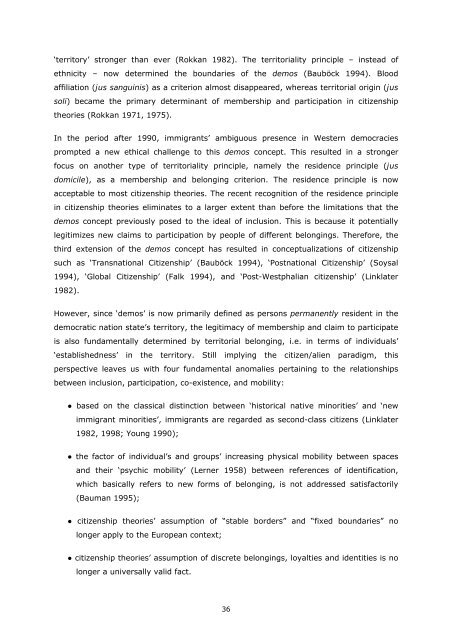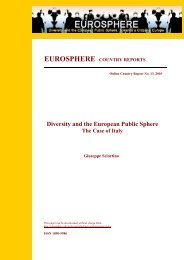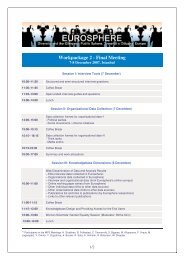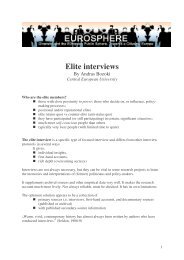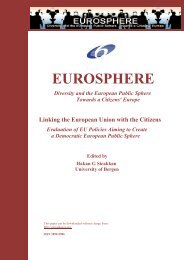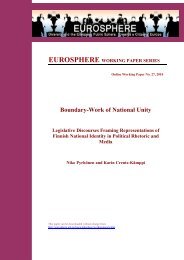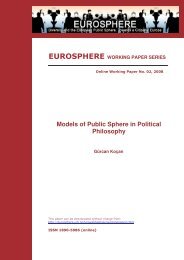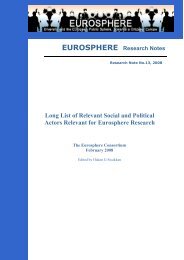Migrants, Minorities, Belongings and Citizenship. Glocalization and ...
Migrants, Minorities, Belongings and Citizenship. Glocalization and ...
Migrants, Minorities, Belongings and Citizenship. Glocalization and ...
Create successful ePaper yourself
Turn your PDF publications into a flip-book with our unique Google optimized e-Paper software.
‘territory’ stronger than ever (Rokkan 1982). The territoriality principle – instead of<br />
ethnicity – now determined the boundaries of the demos (Bauböck 1994). Blood<br />
affiliation (jus sanguinis) as a criterion almost disappeared, whereas territorial origin (jus<br />
soli) became the primary determinant of membership <strong>and</strong> participation in citizenship<br />
theories (Rokkan 1971, 1975).<br />
In the period after 1990, immigrants’ ambiguous presence in Western democracies<br />
prompted a new ethical challenge to this demos concept. This resulted in a stronger<br />
focus on another type of territoriality principle, namely the residence principle (jus<br />
domicile), as a membership <strong>and</strong> belonging criterion. The residence principle is now<br />
acceptable to most citizenship theories. The recent recognition of the residence principle<br />
in citizenship theories eliminates to a larger extent than before the limitations that the<br />
demos concept previously posed to the ideal of inclusion. This is because it potentially<br />
legitimizes new claims to participation by people of different belongings. Therefore, the<br />
third extension of the demos concept has resulted in conceptualizations of citizenship<br />
such as ‘Transnational <strong>Citizenship</strong>’ (Bauböck 1994), ‘Postnational <strong>Citizenship</strong>’ (Soysal<br />
1994), ‘Global <strong>Citizenship</strong>’ (Falk 1994), <strong>and</strong> ‘Post-Westphalian citizenship’ (Linklater<br />
1982).<br />
However, since ‘demos’ is now primarily defined as persons permanently resident in the<br />
democratic nation state’s territory, the legitimacy of membership <strong>and</strong> claim to participate<br />
is also fundamentally determined by territorial belonging, i.e. in terms of individuals’<br />
‘establishedness’ in the territory. Still implying the citizen/alien paradigm, this<br />
perspective leaves us with four fundamental anomalies pertaining to the relationships<br />
between inclusion, participation, co-existence, <strong>and</strong> mobility:<br />
● based on the classical distinction between ‘historical native minorities’ <strong>and</strong> ‘new<br />
immigrant minorities’, immigrants are regarded as second-class citizens (Linklater<br />
1982, 1998; Young 1990);<br />
● the factor of individual’s <strong>and</strong> groups’ increasing physical mobility between spaces<br />
<strong>and</strong> their ‘psychic mobility’ (Lerner 1958) between references of identification,<br />
which basically refers to new forms of belonging, is not addressed satisfactorily<br />
(Bauman 1995);<br />
● citizenship theories’ assumption of “stable borders” <strong>and</strong> “fixed boundaries” no<br />
longer apply to the European context;<br />
● citizenship theories’ assumption of discrete belongings, loyalties <strong>and</strong> identities is no<br />
longer a universally valid fact.<br />
36


